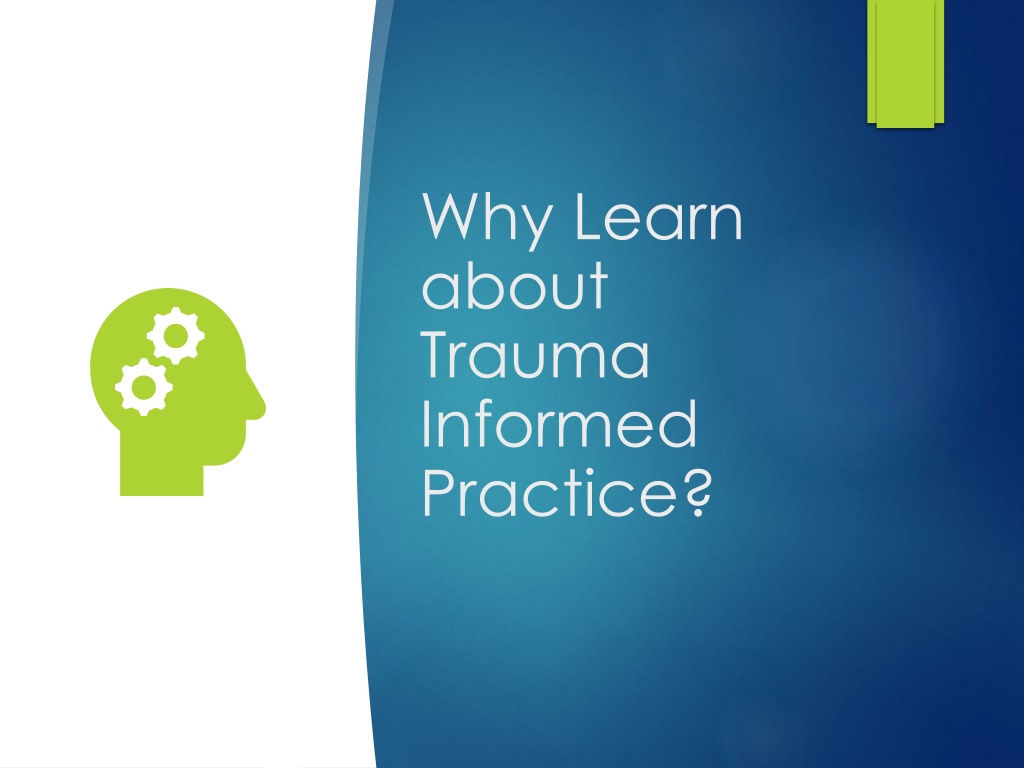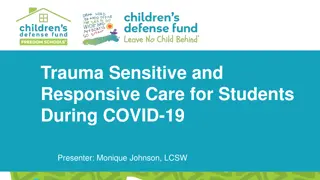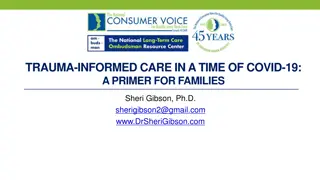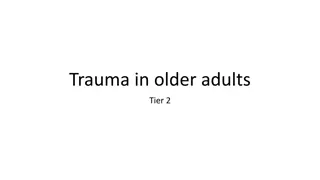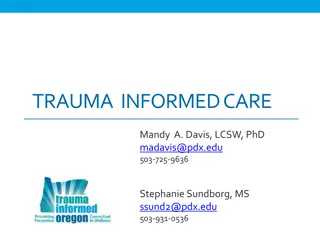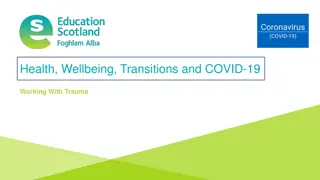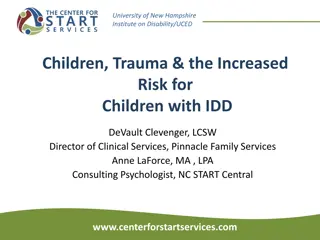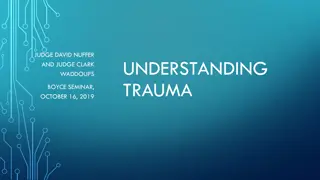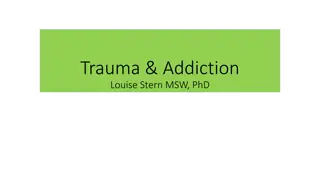Understanding Trauma: Key Elements and Neurobiological Impact
Trauma-informed practice involves being aware of trauma's presence, understanding its effects on physical and emotional well-being, and working with trauma symptoms constructively. Trauma can arise from direct exposure, witnessing, or indirect experiences, affecting memory encoding and retrieval. The neurobiology of trauma triggers instinctive responses, altering brain function and memory. Post-trauma, individuals may feel overwhelmed, flooded with emotions, and struggle to articulate their experiences.
Download Presentation

Please find below an Image/Link to download the presentation.
The content on the website is provided AS IS for your information and personal use only. It may not be sold, licensed, or shared on other websites without obtaining consent from the author. Download presentation by click this link. If you encounter any issues during the download, it is possible that the publisher has removed the file from their server.
E N D
Presentation Transcript
Why Learn about Trauma Informed Practice?
Key Elements of a Trauma Informed Practice Being aware of the presence of trauma Understanding how traumatic experience can affect a person s physical, emotional, social and cognitive functioning Working with a client s trauma symptoms, not against them Developing a strong repertoire of trauma informed practices
What is trauma? A person is confronted with the death, threatened death, actual or threatened serious injury, or actual or threatened sexual violence, as follows: 1. Direct exposure 2. Witnessing, in person 3. Indirectly, by learning that a close relative or close friend was exposed to trauma. 4. Repeated or extreme indirect exposure to aversive details of the event(s), usually in the course of professional duties (e.g., first responders). DSM-5, American Psychiatric Association, 2013
The Neurobiology of Trauma and Behavior HUMANS ARE PREY WHO DEVELOPED A HIGHLY EFFECTIVE BIOLOGICAL RESPONSE TO FEAR TO INCREASE CHANCES OF SURVIVAL. FEAR TRIGGERS THE PRIMITIVE BRAIN TO SIGNAL A CASCADE OF NEUROCHEMICALS AND HORMONES THAT INSTANTLY ALTER HEART RATE, BREATHING, BLOOD DISTRIBUTION, AND PUPIL DILATION THIS RESPONSE IS UNCONSCIOUS, BYPASSING THE PREFRONTAL CORTEX AND WIRED DIRECTLY TO THE AMYGDALA, LOCATED IN THE PRIMITIVE BRAIN.
The Neurobiology of Trauma and Memory Neurochemical environment of trauma affects how memory of the trauma is encoded, and thus how it is latter accessed Traumatized person cannot generate the same kind of narrative memory Memory typically fragmented, out of sequence, with gaps Intense detailed memory of some things, fuzzy or no memory of other things Memories may rise to surface over time
Post-Trauma Brain Seeing Overwhelmed with Images of the Trauma Feeling Flooded by Emotions Experienced During Trauma Not Speaking No Language to Describe the Events
Behavior and Affect Some may be combative or angry, others very passive and fearful Some may express a lot of distress, others may have flat affect May appear secretive or paranoid, overly dramatic or zombie like
Trauma Indicators in Interviews A STORY THAT DOESN T FIT TOGETHER OR HAS GAPS STORY THAT DOESN T UNFOLD IN A COHERENT WAY/CLIENT IS JUMPING AROUND IN THE STORY. CLIENT EXHIBITS FLAT AFFECT/NO EMOTION/ODD RESPONSE CLIENT SEEMS OVERLY DISTRAUGHT CLIENT LOOKS SPACED OUT OR UNDER THE INFLUENCE OF DRUGS OR ALCOHOL.
Traumatized clients may not Respond to your calls Unreliable Client Show up for appointments, meetings, or court hearings Provide necessary documents or information you need to respond to court, opposing party
Unrealistic Expectations of the Justice System Client believes you are on other party s side Client fears you don t understand how tricky other side can be Client demands unreasonable outcomes or tactics
Crossing Boundaries Client asks you for advice on personal issues outside of legal process Client calls multiple times per day or week Client repeatedly asks about your personal life
Work with the Trauma Use gentle prompts: What s the next thing you remember? How did you respond to that? Allow client to control the flow of the narrative Do not insist on a chronological account Use non-verbal communication to indicate you are listening Allow for breaks or more than one session
Communication Tools Neurobiologic response to trauma may impact: memory, retention of information, focus and concentration. Provide information in multiple ways and multiple times. verbal and written summaries and reminders.
Compassionate Truth Understand this might be far off from what client expects or wants Set Realistic Expectations
Healthy Boundaries Create a framework within which empowering and respectful interactions can occur.
Unhealthy Boundaries Rescuing is when we act outside of the scope of our professional responsibilities, and perhaps outside of our expertise, in a misguided attempt to rescue the client from her circumstances. Judgment (minimizing or evaluating the merits of your client s experience and choices) a way in which we distance ourselves from another s pain or vulnerability.
Don't be the next controlling person in the client s life. Client- Centered Advocacy Provide options and implications, not answers Non-judgmental statements about client behavior that might damage her case
Preparing for Court Explain Team up Prepare Strategize Plan Go over what to expect Team up with a advocate or support person Plan for how to deal with the abuser s presence in the courtroom Know what to do if the survivor is triggered during the court proceedings. Explore safety options for before, during and after court
Provide added emotional support for your client Ensure that your client has access to someone with expertise in exploring safety options Working with Advocates Assist your client in self- organization, helping you get the information and materials you need from the client to support your case Keep you and/or your client informed about any pending criminal matters that may impact the divorce or custody case or personal protection order matter
Mental Health Professionals Identify and communicate her needs Sift through and process information Assist in making decisions that are best for her Flag when her emotional expectations may be unrealistic Discuss when she is either looking for her lawyer to rescue her, or vilifying her attorney because the attorney can t get her what she wants Help her prepare for and manage trauma reactions to highly intense or difficult situations
